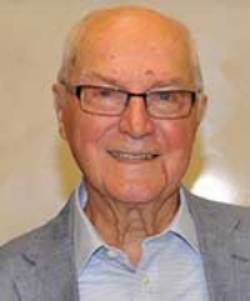
Justice Edward A. Panelli (1931 – 2024)
The late Justice Edward A. Panelli was a founding member of the West Valley-Mission Community College District board. He played a crucial role in establishing West Valley College by hiring its initial leadership and securing the land where it now stands. His contributions to the board until 1972 helped shape the educational landscape in Saratoga and the larger community. This visionary effort paved the way for an institution that provides students with quality education and opportunities.
He referred to West Valley as the “gem of Saratoga,” underscoring his enduring commitment to the college’s values and mission.
After serving on the WVMCCD board for several years, Justice Panelli resigned to serve on the Santa Clara County Superior Court. He quickly rose through the ranks and became an associate justice on the First District Court of Appeals and the presiding justice of the Sixth Appellate District Court of Appeal. In 1985, he was appointed associate justice of the California Supreme Court. After leaving the state Supreme Court in 1994, he joined the Judicial Arbitration and Mediation Service (JAMS) as a private judge. Justice Panelli attended the public schools of Santa Clara and graduated from Santa Clara High School. He earned his bachelor’s degree and his juris doctorate from Santa Clara University.
Randy Fujishin
When Randy Fujishin taught communications courses at West Valley College, a joke circulated on campus that more students from his classes got married each year than from the rest of the college combined. Fujishin, who retired in 2012 after 38 years on faculty, says there’s truth behind the talk.
“My classes provided students with the chance to share deeply and care deeply about one another,” Fujishin said. “Two to three couples from my 10 communication classes per year would eventually marry, and I would receive wedding invitations from them. For years I would attend the weddings, but eventually it came to a point where I would just send a gift or card and wish them well.”
It’s just one example of the impact Fujishin has had on West Valley. As faculty member and department chair, he touched thousands of students’ lives, teaching them the art of communication in all its forms, from interpersonal to public speaking.
Students would come early to his classes and stay afterwards, chatting with other students and also with Fujishin. Tears were shed and hugs shared between students who might never interact outside class. With half of each class time interactive, students learned skills and techniques they could use right away in their day-to-day lives. Along the way, they also made great friends in class. Above all, Fujishin said: “They knew I loved them.”
Less than 1 percent of students in Fujishin’s courses dropped the class, he said. His classes became so popular, in fact, that during his stints as department chair, Fujishin would often assign himself the worst time slots to make sure the classes filled. “This was a calling,” he said. “The students were just a delight.”
Fujishin’s love of West Valley extended beyond the classroom and encompassed everything about the college. He called his colleagues “fabulous.”
“I loved working with people who placed a higher priority on people rather than product,” he said. “I loved being around teachers. They’re people who like to read, like to travel, who have varied interests. I loved their hearts, how altruistic they were. They weren’t teaching for fame or power. They’re not as focused on productivity in terms of widgets or making sales or going through the ranks.”
And because his father was a gardener, Fujishin also understood the college couldn’t run smoothly without the behind-the-scenes employees; he’d sometimes stop by to have lunch with the maintenance crew and others working in the back room. Other times at lunch, Fujishin brought a beach chair and sat down near the creek–just 50 yards from the cafeteria, but “it felt like being in the middle of Montana,” he said.
“It’s a magical college,” Fujishin said. “You’re placed in Saratoga at the foot of the Santa Cruz mountains, away from the hustle and bustle. The energy is different. It’s like a state park.”
Simply walking from class to class, “there’s a soothing of the soul that takes place, not just for students but faculty as well,” Fujishin said. For one-on-one meetings, Fujishin often suggested walking through campus while talking, taking a moment to look up at the mountains nearby. “The environment there played a big role in the culture of the campus,” he said.
These days, Fujishin spends his time consulting with churches and pastors, speaking at conferences, writing books, and riding motorcycles. Still, he is deeply connected to his time at West Valley College, mentoring dozens of former students who have gone on to teaching careers themselves. He also meets regularly with about 10 local pastors–all former students.
“It was a glorious career,” Fujishin said. “Every day was a preview to heaven.”
Michael E. Fox Sr.
When referring to his connection to West Valley College, the late Michael E. Fox Sr. would point to his own age as one example of his connection to the college.
“We sort of grew up together,” said Fox, a longtime Saratoga resident who regularly trained for marathons with a running group that ran through the beautiful tree-lined campus. “I really watched it emerge and took a real interest in it.”
Fox did much more than watch West Valley College take shape. He also helped guide the college as one of the founding members and early chairs of the West Valley-Mission Advancement Foundation board, raising much-needed funds for a wide variety of facilities, programs, and projects, including refurbishing the college theater. With friends across the political spectrum, Fox often would tap into his network and expertise to help move projects forward.
Fox, for whom the college’s M.E. Fox Technology Center is named, served on the foundation board until shortly before his November 2024 passing, offering advice based on a lifetime of community involvement.
In addition to his WVC work, Fox was involved with the Defenders Lodge, a free lodge for veterans and their caregivers at the Palo Alto VA Healthcare System, and with Habitat for Humanity.
Fox served on numerous boards in the community, including a chairmanship of the Eastfield Ming Quong. He also founded and chaired the Santa Clara County Valley Medical Center Foundation with an initial gift. Additionally, Fox chaired the Board of Regents at Santa Clara University, the San Jose Metropolitan Chamber of Commerce, and the National Conference of Christians and Jews.
Born in Chicago, Fox completed his education in the Midwest, at Notre Dame University and the Siebel Institute of Technology, where he obtained a postgraduate degree in brewing science and technology. In 1959, he married Mary Ellen Croke, and they moved to San Francisco, where they began their family of six children. In 1965, the Foxes founded M.E. Fox and Co. Inc., a small beverage distribution firm in Santa Clara County. They started with 10 employees and annual sales of approximately $1 million. Decades later, the company reported exponential growth with more than 200 employees and annual revenues of approximately $70 million.
As he grew the company, Fox served on multiple educational boards in addition to the WVC foundation. That commitment to education persisted in his formal role as a board member and informally as a supporter and champion of West Valley College.
Asked about WVC, Fox inevitably described what an incredible benefit the college is to the community as an institution that makes learning accessible to everyone. From those right out of high school to those returning to college later to those interested in taking just a class or two, the college provides a lower-cost educational alternative to a wide range of students. The academic quality is stellar, he said: “The faculty are excellent. They are a group of people who are really dedicated to teaching.”
Additionally, the college provides a wealth of arts-related resources to the community, including its arts program, drama program, and beautiful theater.
While what the next 60 years holds in store remains to be seen, Fox expressed confidence in the leadership role of community colleges in adapting to future challenges and providing lifelong learning opportunities. His many contributions left an indelible legacy, as reflected in his own words: “West Valley College is at the forefront of community colleges and well-positioned for the future.”
Fox passed away peacefully at the age of 87 on November 3, 2023, surrounded by his six children and loving wife of 64 years, Mary Ellen.
Napoleon Mendes da Costa
For Napoleon Mendes da Costa, West Valley College not only provided a solid education, but also the opportunity to build a career and flourish as a union leader.
Mr. da Costa, who retired in December 2013, first began his connection to WVC in 1964 when he began as a student at the college’s original location in Campbell. When West Valley moved to its current location, Mendes da Costa was among the first students to attend classes there. A psychology major, he also was one of the young college’s first student body presidents.
But Mendes da Costa’s education was cut short when he enlisted in the Army and then made a career out of the military until 1980. After leaving the Army, he eventually returned to California and decided to once again study at West Valley College.
“I was living in San Antonio before I actually came back to West Valley, but I visited my parents back here and I did come and visit the campus,” Mendes da Costa said. “I was really impressed with it. I thought, ‘I’m going to start here again.’ It was like a renewal, a starting-over.”
Not long after restarting his studies, Mendes da Costa began working at the college district’s warehouse. While his actual duties and assignments shifted over the years, Mendes da Costa primarily worked as a warehouse clerk, checking purchase orders, carrying mail to departments and delivering packages.
His dedication to the college, however, extended beyond his job duties. He also volunteered with the classified staff union, initially SEIU as it was phased out, and then with the West Valley-Mission Classified Employees Association. In fact, due to Mendes da Costa’s commitment to his fellow union employees, he put off retiring, first serving two years as president of WVMCEA and getting the new union solidly in place. For him, it was a way of ensuring WVC was the best place possible to work and an opportunity to give back to other employees.
It was the people at West Valley College, Mendes da Costa said, that kept him around for so long. “There was a lot of caring between people,” he said.
“I think I was there for a reason,” Mendes da Costa said. “Coming back to West Valley, there must have been a reason.” Having the opportunity to help with the union, he said, was a big one.
That certainly wasn’t on Mendes da Costa’s mind when he first enrolled at West Valley College. In fact, his connection to the college started simply because his family was committed to education–his father had been a teacher in Indonesia–but there was no money to send him to a four-year university. His mother suggested he try a community college. It’s a refrain that still rings true today.
“The cost of education is becoming increasingly higher,” Mendes da Costa said. “Community colleges are important; they’re places where the teachers can spend a little more time teaching students what’s expected. Community colleges really help people to set themselves up, to prepare themselves for something bigger.”
West Valley College did precisely that for Mendes da Costa, as a student, employee, and champion union leader. “I’m grateful that I was very well blessed with a good life,” he said.
William “Bill” Cilker Sr. (1919-2018)
The late William “Bill” Cilker Sr.’s roots ran deep in the Valley of the Heart’s Delight.
Along with his late wife, Lee, he had an impact throughout the South Bay for decades, growing prunes, apricots, and more in their orchards; developing some of their agricultural lands; and serving key roles in establishing such organizations as Second Harvest Food Bank. Their impact continues through the strength of Cilker Orchards, founded in 1965 as a family agricultural company, and now the owner and manager of commercial, multifamily, and agricultural properties.
At West Valley College, Bill Cilker played a key role in the college’s growth through his service as an early trustee of the college district board. The Cilkers’ commitment to the local community began decades ago.
Born into a farming family, Bill Cilker grew up picking prunes and cutting apricots. He paid his way through Stanford University, graduating magna cum laude with a degree in mechanical engineering before heading to Detroit. There, he was part of the Chrysler Institute, designing equipment for World War II while also earning an advanced engineering degree.
When he returned to California, Cilker married Lee, whom he’d met at Stanford, and the two had the opportunity to purchase an orchard on Blossom Hill Road in Los Gatos. The young couple settled on the property, making it their first home as they raised four children and managed the orchard. They continued buying agricultural properties in the area and, eventually, in the Central Valley.
Throughout, Cilker worked at FMC Corp. When the project he was working on was cancelled, he decided to focus on the orchards full-time. “One day I was wearing a suit, the next day I was in jeans driving a tractor,” he said.
As Cilker Orchards grew, the company sold some of its orchards, including one that was developed into the original Kaiser Santa Clara. Samaritan Medical Center also was built on family property.
Throughout, Cilker was active in the community, including serving on the founding board of the Second Harvest Food Bank. When his children were in elementary school, Cilker was involved with the PTA and later served as a trustee for the Los Gatos-Saratoga Joint Union High School District during the time the college district was formed. He soon was elected to the new district board, helping shape West Valley College in its early years.
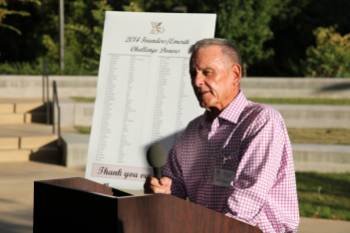
Dr. Melvin F. Tuscher
It was during a National Science Foundation summer fellowship program at Stanford University that Melvin “Mel” Tuscher learned of an exciting opportunity to teach math at the newly founded West Valley College.
In 1964, he became one of the first two math faculty members at West Valley. He then dedicated nearly three decades to West Valley College and its students, retiring in 1993. Tuscher’s 29-year tenure at the college included service in several positions, including science and math division chair, dean of instruction, and college president from 1976 to 1981.
When reflecting upon his time at West Valley, Dr. Tuscher most readily recalled the excitement of the first year of founding the college and the camaraderie among the founders despite the challenges and hard work associated with building something new. A former United States Marine and high school math Instructor, Tuscher earned a master’s degree in mathematics from the University of Minnesota and a Ph.D. in higher education from the University of Southern California.
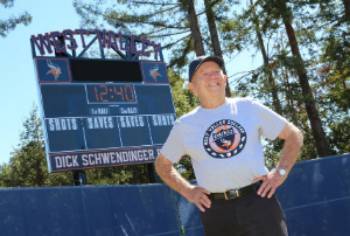
Richard Schwendinger
Richard “Dick” Schwendinger has strong roots within the West Valley-Mission Community College District, commencing with his 22-year tenure as a founding faculty member and coach at West Valley College.
As the architect behind the West Valley soccer program, he dedicated two decades as a passionate coach, elevating the team to new heights. In 1971, Schwendinger also started the first youth soccer league in Saratoga. In the same year, the city of Saratoga named Schwendinger Citizen of the Year. Simultaneously, his role as the college golf coach produced Northern California Championship title wins and seven league titles over eight seasons.
Schwendinger established a youth camp called Two Rivers Soccer Camp, based in Graeagle in the Sierra Nevada. The camp has hosted more than 60,000 campers since its start in 1974.
Beyond the field, Schwendinger served as the respected broadcast voice of the San Jose Earthquakes. In 2017, “Dick Schwendinger Field” at West Valley College, was named in honor of Schwendinger for his dedication and contribution to the sport of soccer.
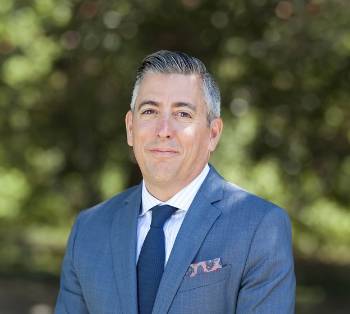 Bradley Davis has more than two decades of senior administrative experience in California public higher education. He is currently in his fifth year as chancellor of the West Valley-Mission Community College District. He oversees a multi-college district that encompasses West Valley College in Saratoga and Mission College in Santa Clara. He previously served as the longest-tenured West Valley president.
Bradley Davis has more than two decades of senior administrative experience in California public higher education. He is currently in his fifth year as chancellor of the West Valley-Mission Community College District. He oversees a multi-college district that encompasses West Valley College in Saratoga and Mission College in Santa Clara. He previously served as the longest-tenured West Valley president.
His leadership has been instrumental in removing barriers for students, having waived parking, health services, and childcare costs for students at district colleges. Davis also championed state legislation in 2024 that allowed WVMCCD to waive all tuition and enrollment fees for district residents. Further, he has been a leader in creating professional development partnerships for classified employees with San Jose State University and developed a leadership academy for rising administrators. Additionally, in a nationwide first, he brought the College of Adaptive Arts, an equitable college experience for adults with disabilities, to the district.
During his West Valley College tenure, the institution established a nationally recognized Veterans Resource Center. The college also achieved multiple statewide firsts, including pioneering the first on-campus mobile food pantry and introducing SafePark, an overnight parking program for students who might otherwise go unhoused. Nationally, West Valley earned recognition as the first community college to be certified “Age-Friendly” by the Age-Friendly University Network.
As chancellor, Davis orchestrated the district’s transition to its current Basic Aid funding model, significantly improving its financial strategy and stability. He is also recognized as the most successful fundraiser in the California Community College system and has been pivotal in securing two facility bonds exceeding $1 billion. In all, Chancellor Davis has stewarded the construction of fifteen new or renovated buildings across the district. Beyond his administrative roles, Davis remains actively engaged in academia as a faculty member in several graduate programs throughout California. His academic credentials include a juris doctorate from Syracuse University’s College of Law and a bachelor's degree in psychology from Gannon University, where he lettered in two NCAA Division II sports: baseball and basketball.
Dr. Bradley Davis has over 25 years of senior leadership experience in California public higher education, currently serving as Chancellor of the West Valley-Mission Community College District. In his fifth year at the helm, Dr. Davis is recognized for his unwavering commitment to student success, equity, and community engagement. He is also the
longest-tenured president in West Valley College history, where he served with distinction for seven years before ascending to the chancellorship.
Under Dr. Davis’s leadership, the district has made bold strides in reducing barriers to higher education. He spearheaded initiatives to waive parking, health services, childcare, and, more recently, all tuition and enrollment fees for district residents. His tenure has seen the district become a model for student-centered policies and innovation, including the development of a nationally recognized Veterans Resource Center, the first on-campus mobile food pantry in the state, and the groundbreaking SafePark overnight parking program for students experiencing homelessness. Dr. Davis also led the district to become the first community college in the country to earn “Age-Friendly” certification from the Age-Friendly University Network.
A passionate advocate for diversity and inclusion, Dr. Davis has been a driving force in creating a more equitable educational environment. As president of West Valley College, he established the institution’s first Office of Student Equity and Success, the President's Commission on Diversity, and the UMOJA Program, among other initiatives. He also forged a partnership with Stanford University to create a pipeline for diverse doctoral students to enter community college teaching. His leadership has been integral in West Valley College's recognition as the top transfer institution in the Bay Area by the state Chancellor’s Office in 2017.
Dr. Davis is widely regarded as the most successful fundraiser in the California Community College system, securing over $10 million in grants and private gifts, including significant donations for building state-of-the-art facilities. He has overseen the construction of 15 new or renovated buildings across the district, including major projects funded by two successful $1 billion bond campaigns. His efforts in philanthropy have enabled the development of key campus facilities, such as the E. Floyd and Jeane Kvamme Planetarium, the William and Leila Cilker School of Art and Design, and the Feng Pei Che Family School of Professional Studies.
A firm believer in the power of education to transform lives, Dr. Davis is deeply committed to professional development for all members of the college community. He initiated partnerships for classified staff training with San Jose State University and developed a leadership academy for rising administrators.
Dr. Davis holds a Juris Doctor from Syracuse University College of Law and a bachelor’s degree in psychology from Gannon University, where he excelled as a student-athlete in NCAA Division II baseball and basketball. He continues to serve as a faculty member in graduate programs across California, reinforcing his dedication to lifelong learning and academic leadership.
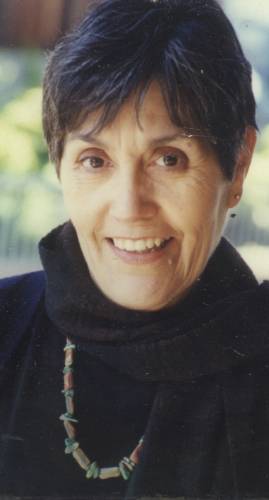
Dr. Lydia Gloria Harris
Lydia Gloria Harris, J.D., an esteemed educator and advocate, joined the West Valley-Mission Community College District in 1976. She began her career in the Early Childhood Education Department, designing and developing the programs at West Valley College and Mission College.
Other duties included serving as vice president and president of the Academic Senate, co-president of the District Academic Senate, district staff development director, grievance officer, chair and team leader of accreditation teams, and chair of numerous additional committees, including the WVC Curriculum Committee, hiring committees, and program review teams. She was also honored as Teacher of the Year three times. At the same time, Harris earned another master’s degree and a juris doctorate. After retirement, she became an associate faculty member and represented the faculty on ACE. She co-founded the West Valley-Mission Association for Retired Employees. Harris is a member of the Child Abuse Council of Santa Clara County and previously was on the Santa Clara County Grand Jury.
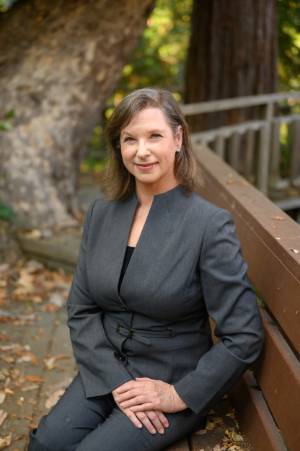
Kookie Fitzsimmons
Saratoga City Council Member Kookie Fitzsimmons was elected to office in 2020 and served as Saratoga mayor in 2022-2023. She is currently serving on the City Council, and her term ends November 2028. Kookie is the first mayor to be born and raised in Saratoga. Before her election, she served on the Saratoga Planning Commission for over 6 years and continues to be a community leader with over 30 years of volunteer service in Saratoga. Kookie’s current profession is clinical research. Previously, she was a small business owner in Saratoga Village for 15 years. Kookie is known for her civic involvement, deep commitment to serving Saratoga, her integrity, fairness, enthusiasm, and courage to speak out as the minority voice on controversial issues. Kookie is a lifelong Saratogan and three generations of her family have called Saratoga home.
Community Service: (partial list) Saratoga Rotary (over 20 years); Saratoga Business Development Council, charter member; Saratoga Village Merchants Association, president; Blossom Festival, chair; Saratoga Village Halloween Costume Walk, chair; Highway 9 Clean-up Project; Stop Hunger Now.
Professional: Leadership roles in clinical research for over 15 years. Demonstrated proficiency with budgets, personnel, and regulatory requirements involving multiple stakeholders. Selected for competitive leadership development; received multiple commendations for outstanding contributions in improving efficiencies; and acknowledged for innovative ideas that contribute to improvements in clinical trials.
